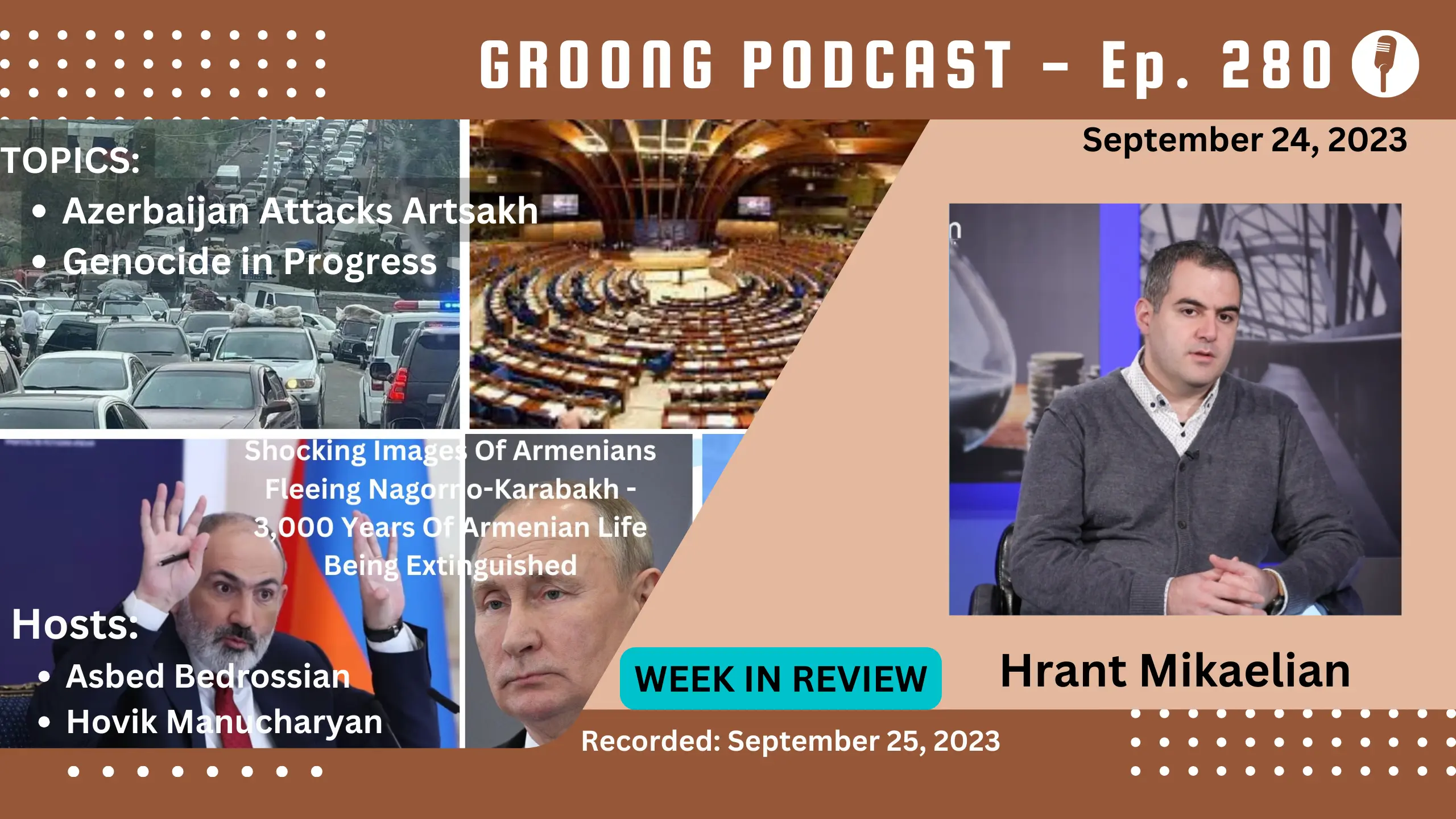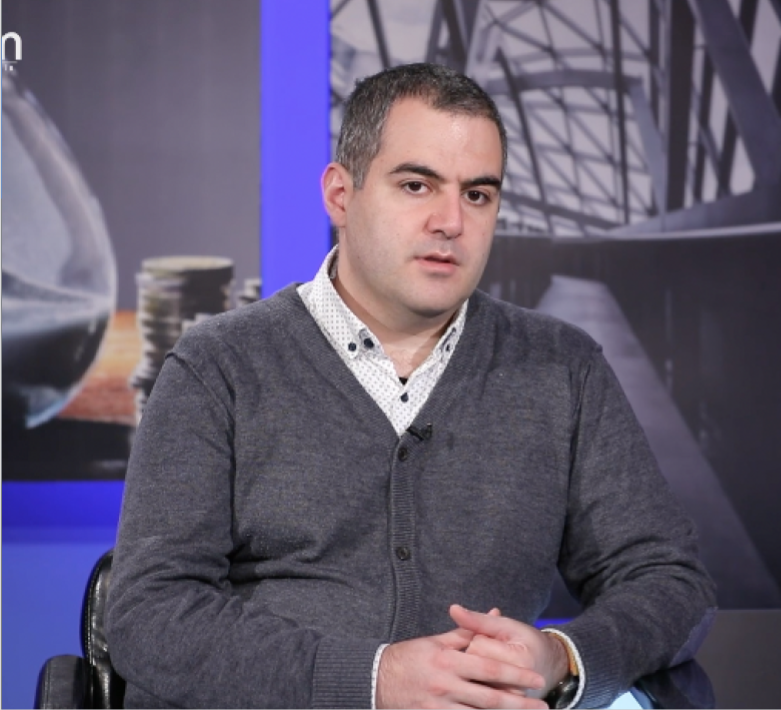
Guest:
Topics:
- Azerbaijan Attacks Artsakh
- Genocide in Progress
Episode 280 | Recorded: Sep 25, 2023
Show Notes
Azerbaijan Attacks Artsakh
A Valiant Battle, An Unavoidable Capitulation
Azerbaijan attacked and invaded Artsakh on September 19th, starting around 1pm. Our guests have consistently highlighted the goal of the Aliyev regime to depopulate Artsakh through soft means, such as gerrymandering and investing financial resources around Artsakh. But it seems like Aliyev was in a hurry. For weeks now most analysts and observers had warned that Azerbaijan was preparing for a military aggression, so there it was.
The narrative that Erdogan presented was that Aliyev and Pashinyan were deeply concerned with the new presidential election in Artsakh and so Azerbaijan went on the offensive.
The situation is extremely dire:
- On September 20, after about 24 hours of intensive warfare, the authorities in Artsakh capitulated.
- They were forced to go to Yevlakh on September 21, Armenian Independence day, to sign away the sovereignty of Artsakh. The points of negotiation forced by Azeris through military means are:
- Disarming and disbanding of the Artsakh Defense Army
- Disbanding all other elements of Artsakh statehood
- “Re-integration” into Azerbaijan without any status
First, let’s note that Artsakh was never part of an independent Azerbaijan and so there is no RE-integration. Aliyev doesn’t consider it a positive for his image, or even a doable thing to massacre 120,000 people in Artsakh, so they’re forcing discussions on dissolving and assimilating the Armenians inside Azerbaijan.
All indications are that Artsakh Defense Forces soldiers fought valiantly to the end. Being outnumbered and out-gunned, the present outcome was an inevitability, barring outside intervention. Yet, none came, not even from Armenia. The casualty count estimate from the Artsakh ombudsman’s office, which hasn’t changed since the first days, is 200 dead, with 400 wounded. But since Azerbaijan managed to slice through Artsakh in multiple points, cutting communication between Stepanakert and the regions, that number is bound to increase once the scale of the losses from the cut off regions becomes known. Unofficial sources report close to 500 servicemen dead, with 600 missing.
There are dozens of civilian deaths, including reports of atrocities as is customary for Azerbaijani military operations. There are unconfirmed reports of grotesque atrocities against civilians, which the media can’t confirm because it’s nearly impossible to communicate with the regions of Artsakh. Azerbaijan itself is reportedly not allowing any access to areas that it has conquered and there are unconfirmed reports of a “clean-up” operation, where potential evidence of atrocities may be removed.
After days of tough deliberations, the authorities in Artsakh informed the populace of their decision to allow for evacuation of those citizens that desire to do so, with priority given to those who have lost their homes and can’t live in Artsakh. In reality, this means all 120K citizens of Artsakh will leave.
Let’s not mince words, this is Ethnic Cleansing, this is Genocide.
Questions:
- Is this the end of Artsakh?
- Who is responsible for losing Artsakh?
As the World Watches
The most humiliating aspect of this bloodbath and ethnic cleansing was the fact that Armenia stood on the side, repeatedly announcing that it has nothing to do with the Artsakh military and it has no plans to intervene in order to save the lives of Armenians.
The international community also stood by and watched.
Some more condemnations were heard.
- The US State Department, which previously announced that it would not tolerate any military attacks against people of Artsakh, issued bland statements of concern and mild condemnation. On Sep 22, at the UN General Assembly meeting, Biden posed for pictures with Bayramov smiling ear to ear.
- The EU also issued mild statements of condemnation, but there are reports that Hungary vetoed a resolution with stronger teeth. However, lest you be confused that the EU would do anything to jeopardize its positions in Azerbaijan, on September 22, 2 days after the bloodbath, the EU inked a new deal with Baku to increase gas supplies.
- Russia reportedly lost at least 5-7 peacekeepers, who also were targeted by Azerbaijan, including the deputy commander of the entire mission. Yet, Putin and Aliyev held a telephone call, the latter apologized, and things seem back to normal. The Russian peacekeepers seem to be fulfilling a strictly humanitarian role, such as delivering supplies to civilians, evacuating the wounded to Armenia, and so on. Meanwhile the Russian media continues to put the blame for what’s going on in Artsakh squarely on Pashinyan’s shoulders, claiming that Russia’s leverage is limited due to Pashinyan’s recognition of Artsakh as Azerbaijan.
The UNSC Theatre Show
Pashinyan and cronies spent the whole time on the phone with European leaders updating them on the situation. The UNSC held a meeting to discuss the situation, and the Pashinyan administration was deeply embarrassed with foreign minister Mirzoyan’s address begging for UN mandated presence to secure the rights and safety of Artsakhtsis and prevent genocide, was negated by Azerbaijani foreign minister Bayramov quoting Pashinyan saying that he believes Artskhtsis will be treated well! Mirzoyan was seen on video furiously exiting the UNSC hall.
Questions:
- How is it possible for this Armenian government to be so deeply disorganized, incompetent and embarrass the whole nation in front of the whole world?
- Are Pashinyan and Mirzoyan not on the same page? Could there be divisions within the ruling party?
Can Anything Be Salvaged?
Since the authorities and the defense forces in Artsakh were forced to lay down their arms, initial concerns centered around how to defend the population. But many Artsakhtsis can’t imagine living under Turkish or Azeri rule as so-called “Azerbaijani Armenians”, given our history for the last century. After all, who today remembers the 300,000 strong community of Armenians of Baku and Sumgait?
The exodus has already begun, and perhaps now the primary concern is how to manage such a mass tragedy. And we’ve read conflicting things about how this is viewed by various actors in the conflict:
What do the main actors say, and what do they think?
- Pashinyan says that Armenia is ready to accept Artsakh refugees, but word is that he’s deeply concerned that such an influx of Artsakhtsis in Armenia would destabilize the political situation against him.
- Aliyev says Artsakhtsis can stay as Azerbaijani citizens, but he’s doing everything possible to make them flee. Like mutilating the bodies of killed Artsakh soldiers, drawing up lists of the men whom he will prosecute as criminals and traitors, and much more. There’s no end to the human tragedy he’s inflicting.
- Russia can’t or won’t raise a finger to defend Artsakhtsis, but would rather see them remain in place, so that they have a reason to stay in the region. But Artsakh is at present very low on Russia’s priorities, compared to Ukraine, so their actions are not where their words are.
- The US and the EU hope to not see an outright massacre, but couldn’t care less about anything else, whether Artsakh is Armenian or Azeri, or Martian. The EU wants a clear path for Caspian energy to flow to Europe, and the US wants Russia out of the area, in order to pursue greater global goals.
Questions:
- What options do Artsakhtsis have?
- What do we know about the agreements reached in Yevlakh? Is there any protection or cover for those fleeing to Armenia?
- What accommodations will there be for 120,000 refugees in Armenia?
Pashinyan’s Statement about “Independence”
On Sep 24, as the mass exodus of Artsakh Armenians picked up steam, Pashinyan felt it necessary to make a public address. The speech appeared intended to talk about Armenia’s sovereignty and independence and Pashinyan felt necessary to include a great deal about Armenia’s relations with Russia here.
Pashinyan Confirmed that Armenia decided to pass the Rome Statute when according to Pashinyan it became apparent that Armenia’s security partnership is not meeting its needs. He went further to blame the Russian peacekeepers for what is going on in Artsakh.
The Russian foreign ministry today (September 25) with a strong rebuke saying that it was only due to personal intervention of Putin that the 2020 war was stopped where it was. The Russian statement also stated that Armenian leadership is trying to sever “centuries-old” ties between Russians and Armenians, at the instigation of the West.
Questions:
- What’s your assessment about Pashinyan’s recent statement and the Russian response?
- How would you analyze the shift towards the “preservation of sovereignty or statehood” message? It seems overnight, the government propaganda has shifted from accusing the Armenian opposition of supporting the corrupt “formers” to accusations that the opposition is supporting the degradation of Armenia’s statehood.
A New Protest Movement
In the aftermath of what transpired, a new protest movement erupted, led by students form Artsakh. In 5 days, the protest has swelled to include individuals who include
Questions:
- Hovik, you’ve been at the protests. What is your sense of what’s happening?
- Hrant, is this protest movement really different from previous attempts by the opposition to force Pashinyan’s resignation? Are the protesters showing any evidence of a new approach?
- There are reports of numerous arrests and evidence of an iron fist policy by Pashinyan against protesters. Is there any echo from international bodies?
- Has this policy been put to action?
- How is this different from 2021? How should it be different?
The protesters announced the formation of a new National Committee, that includes Vazgen Manukyan, Hayk Mamijanyan, Avetik Chalabyan, Ishkhan Saghatelyan, etc…
In reality, this seems to be a reformulation of the Homeland Salvation Movement idea.
Wrap-up
We hope you found our Week in Review helpful. We invite your feedback and your suggestions, you can find us on most social media and podcast platforms. Thanks to Laura Osborn for the music on our podcasts.
Guests

Hrant Mikaelian
Hrant Mikaelian, a political scientist and multidisciplinary researcher in social sciences based in Yerevan. He is also a senior researcher at the Caucasus Institute. Hrant is a co-founder of the Armenian Project.
Hosts

Hovik Manucharyan
Hovik Manucharyan is an information security engineer who moved from Seattle to Armenia in 2022. He co-founded the ANN/Groong podcast in 2020 and has been a contributor to Groong News since the late 1990s.
Disclaimer: The views expressed by Hovik Manucharyan on the ANN/Groong podcast are his own and do not necessarily reflect the opinions of his employer or any other organization.

Asbed Bedrossian
Asbed is founder of the Armenian News Network Groong and co-founder of the ANN/Groong podcast.